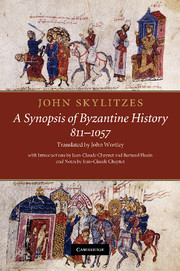Book contents
- Frontmatter
- Contents
- The English translator’s Preface
- Introduction
- Re-writing history: John Skylitzes’ Synopsis historion
- Foreword
- Chapter 1 Michael I Rangabe, the Kouropalates [811–813]
- Chapter 2 Leo V the Armenian [813–820]
- Chapter 3 Michael II the Stammerer [820–829]
- Chapter 4 Theophilos [829–842]
- Chapter 5 Michael III, the son of Theophilos [842–867], and his mother Theodora [842–862]
- Chapter 6 Basil I Kephalas, the Macedonian [867–886]
- Chapter 7 Leo VI the Philosopher (the Wise) [886–912]
- Chapter 8 Alexander [912–913]
- Chapter 9 Constantine VII, Porphyrogennetos [913–959]
- Chapter 10 Romanos I Lekapenos [919–944]
- Chapter 11 Constantine VII [944–959]
- Chapter 12 Romanos II the Younger [959–963]
- Chapter 13 Basil II Bulgaroktonos and Constantine VIII [976–1025]
- Chapter 14 Nikephoros II Phokas [963–969]
- Chapter 15 John I Tzimiskes [969–976]
- Chapter 16 Basil II and Constantine VIII bis [976–1025]
- Chapter 17 Constantine VIII [1025–1028]
- Chapter 18 Romanos III Argyros [1028–1034]
- Chapter 19 Michael IV the Paphlagonian [1034–1041]
- Chapter 20 Michael V Kalaphates [1041–1042]
- Chapter 21 Constantine IX Monomachos [1042–1055]
- Chapter 22 Theodora [1055–1056]
- Chapter 23 Michael VI the Elder/Stratiotikos [1056–1057]
- Glossary
- Bibliography
- Index
- References
Chapter 10 - Romanos I Lekapenos [919–944]
Published online by Cambridge University Press: 05 July 2014
- Frontmatter
- Contents
- The English translator’s Preface
- Introduction
- Re-writing history: John Skylitzes’ Synopsis historion
- Foreword
- Chapter 1 Michael I Rangabe, the Kouropalates [811–813]
- Chapter 2 Leo V the Armenian [813–820]
- Chapter 3 Michael II the Stammerer [820–829]
- Chapter 4 Theophilos [829–842]
- Chapter 5 Michael III, the son of Theophilos [842–867], and his mother Theodora [842–862]
- Chapter 6 Basil I Kephalas, the Macedonian [867–886]
- Chapter 7 Leo VI the Philosopher (the Wise) [886–912]
- Chapter 8 Alexander [912–913]
- Chapter 9 Constantine VII, Porphyrogennetos [913–959]
- Chapter 10 Romanos I Lekapenos [919–944]
- Chapter 11 Constantine VII [944–959]
- Chapter 12 Romanos II the Younger [959–963]
- Chapter 13 Basil II Bulgaroktonos and Constantine VIII [976–1025]
- Chapter 14 Nikephoros II Phokas [963–969]
- Chapter 15 John I Tzimiskes [969–976]
- Chapter 16 Basil II and Constantine VIII bis [976–1025]
- Chapter 17 Constantine VIII [1025–1028]
- Chapter 18 Romanos III Argyros [1028–1034]
- Chapter 19 Michael IV the Paphlagonian [1034–1041]
- Chapter 20 Michael V Kalaphates [1041–1042]
- Chapter 21 Constantine IX Monomachos [1042–1055]
- Chapter 22 Theodora [1055–1056]
- Chapter 23 Michael VI the Elder/Stratiotikos [1056–1057]
- Glossary
- Bibliography
- Index
- References
Summary
After Romanos had received the imperial diadem, he crowned Theodora his wife on the same day, Epiphany; and at Pentecost in the month of May he had his son Christopher crowned by Constantine [VII], who managed to give the appearance of doing it willingly although he was being coerced; but he was distraught when not in the public eye and deeply lamented this misfortune in private. Only the two emperors [Constantine and Romanos] took part in the procession that day.
In the month of July, the eighth year of the indiction, the church was united. The metropolitans and clergy who had been at odds and differed with each other in support of the patriarch Nicholas or of Euthymios were reconciled. The emperor Romanos exiled the magister Stephen to the island of Antigone for aspiring to be emperor and tonsured him a monk. Theophanes Teicheotes and Paul the Orphanotrophos, his closest associates, went with him too. While a solemn procession was making its way to the tribunal, the emperors suddenly returned to the palace: they had received information that a conspiracy was afoot. The leading conspirators, the patrician Arsenios and Paul Manglabites, were arrested, blinded, deprived of their property and sent into exile. That was the year in which the emperor Romanos made Leo Argyros his son-in-law by marriage to his daughter, Agatha. Leo was a man of great nobility and distinguished appearance, endowed with wisdom and intelligence.
- Type
- Chapter
- Information
- John Skylitzes: A Synopsis of Byzantine History, 811–1057Translation and Notes, pp. 206 - 224Publisher: Cambridge University PressPrint publication year: 2010

